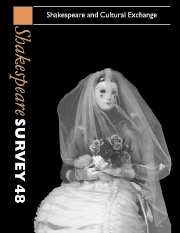Book contents
- Frontmatter
- Shakespeare Translation as Cultural Exchange
- Shakespeare, Theatre Production, and Cultural Politics
- ‘Amphitheaters in the Body’: Playing with Hands on the Shakespearian Stage
- ‘Shakespur and the Jewbill’
- Wilhelm S and Shylock
- Pilgrims of Grace: Henry IV Historicized
- Holy war in Henry V
- Hamlet and the Anxiety of Modern Japan
- Hamlet’s Last Words
- Venetian Culture and the Politics of Othello
- ‘My Music for Nothing’: Musical Negotiations in The Tempest
- The Tempest and Cultural Exchange
- Caliban and Ariel Write Back
- Shakespearian Rates of Exchange in Czechoslovakia 1945–1989
- ‘Are you a Party in this Business?’ Consolidation and Subversion in East German Shakespeare Productions
- The Martyred Knights of Georgian Shakespeariana
- Shakespeare Performances in England, 1993–1994
- Professional Shakespeare Productions in the British Isles, January – December 1993
- 1 Critical Studies
- 2 Shakespeare’s Life, Times, and Stage
- 3 Editions and Textual Studies
- Books Received
- Index
‘Shakespur and the Jewbill’
Published online by Cambridge University Press: 28 March 2007
- Frontmatter
- Shakespeare Translation as Cultural Exchange
- Shakespeare, Theatre Production, and Cultural Politics
- ‘Amphitheaters in the Body’: Playing with Hands on the Shakespearian Stage
- ‘Shakespur and the Jewbill’
- Wilhelm S and Shylock
- Pilgrims of Grace: Henry IV Historicized
- Holy war in Henry V
- Hamlet and the Anxiety of Modern Japan
- Hamlet’s Last Words
- Venetian Culture and the Politics of Othello
- ‘My Music for Nothing’: Musical Negotiations in The Tempest
- The Tempest and Cultural Exchange
- Caliban and Ariel Write Back
- Shakespearian Rates of Exchange in Czechoslovakia 1945–1989
- ‘Are you a Party in this Business?’ Consolidation and Subversion in East German Shakespeare Productions
- The Martyred Knights of Georgian Shakespeariana
- Shakespeare Performances in England, 1993–1994
- Professional Shakespeare Productions in the British Isles, January – December 1993
- 1 Critical Studies
- 2 Shakespeare’s Life, Times, and Stage
- 3 Editions and Textual Studies
- Books Received
- Index
Summary
Two hundred and twenty-five years ago David Garrick’s Stratford Jubilee helped establish Shakespeare as a national poet and as a permanent cultural fixture, one who, in Jane Austen’s familiar phrase, would soon enough become part of an Englishman’s constitution. Garrick’s subsequent play – called The Jubilee and written for those unable to attend the celebrations in Stratford – further secured this reputation, while positioning Shakespeare against those at the periphery of English culture. The Jubilee includes a bumbling unnamed ‘Irishman’ who travels from Dublin to witness the festivities only to sleep through them and return, as he says, to ‘go home and be nowhere’. The play also contains a comic exchange between Stratford locals, who, when they hear celebratory fireworks, fear that ‘’Tis certainly a plot of the Jews and Papishes’, a confusion no doubt exacerbated by the fact that to them, the word ‘ju-bil-ee’ sounded a lot like ‘Jew Bill’. Sukey, a young woman of Stratford, explains to her friend Nancy (who wonders ‘who is this Shakespur, that they make such a rout about ‘en?’) that had ‘you lived at Birmingham or Coventry, or any other polite cities, as I have done, you would have known better than to talk so of Shakespur and the Jewbill’. By framing the Jubilee events with the skewed perspective of these outsiders, incapable of grasping the difference between a local hero and a Jewish threat, Garrick offers up a Shakespeare who cannot possibly belong to Stratford, let alone to the boorish Irish, but is the rightful property of a cultivated London society that can properly know his worth.
- Type
- Chapter
- Information
- Shakespeare Survey , pp. 51 - 60Publisher: Cambridge University PressPrint publication year: 1996
- 4
- Cited by



